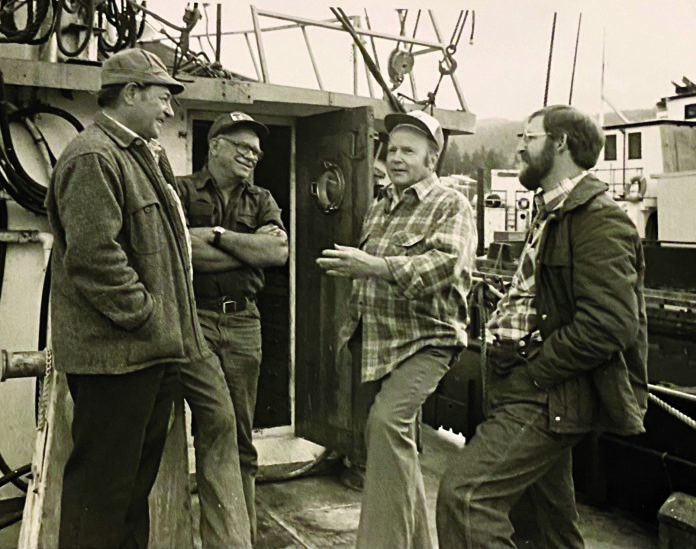
A child of the Great Depression who rose to become the Speaker of the House and later president of the Senate in the Alaska Legislature, Jalmar Kerttula had a passion for his adopted state, and a special place in his heart for Cordova.
“He loved Cordova,” said his daughter, Beth Kerttula, also a veteran of the Legislature, who now lives in Juneau. Her father passed away on Nov. 13 in Juneau.
“He was a farmer, not a fisherman, but they have a lot in common.”
Kerttula also represented Cordova for most of his 34 years in the Legislature, as the community was part of his House and Senate districts, and he was instrumental in development the hatchery system that because part of Prince William Sound Aquaculture Corp., she said.
Kerttula, known to all as “Jay,” was born on April 6, 1928, and came to Alaska’s Matanauska Valley with his family as a young lad from Depression-ridden northern Minnesota.
Beth Kerttula recalled that “keen sense of social injustice, his understanding of how it felt to be an immigrant, and his lifelong belief in the power of education were formed during his childhood as part of FDR’s New Deal project in Alaska.
“The families helped each other build farms and structured the town of Palmer. They also started the farming cooperative ‘Matanuska Maid’,” she said. Years later, her dad had his own dairy farm and said that managing the cooperative taught him the fundamentals of politics, she said.
He first served in the House in 1961, two years after statehood and that legislative career went on for 34 years.
Kerttula, along with leaders like John Butrovich, Frank Ferguson, Don Harris, John Sackett, Bill Egan, Jimmy Huntington, Bill Boardman and others were able to put partisan politics aside and focus on issues, his daughter said.
“As close friend Sen. Clem Tillion said, for Jay Kerttula, ‘regardless of party, Alaska always came first’,” Beth Kerttula said.
He knew how to argue on the House or Senate floor and walk off friends with political adversaries. During long House sessions in the early days of the Legislature a magnetic chess board was often seen being passed across the aisle between Minority Leader Kerttula and Majority Leader Ted Stevens and Kerttula and Stevens remained lifelong friends.
“While Kerttula mastered the legislative chess game, it was no game to him. He understood the importance of every bill, budget item, and vote,” she said. “He often chaired or was a member of the Finance Committees and Legislative Budget and Audit. His math skills never left him – to his last days, he could do complex equations in his head.”
Kerttula’s famous “Donut District” ranged from Denali National Park to Cordova and Valdez, Seward and South Anchorage. He had an impact through legislation on many areas of Alaska life, including education and health care, Pioneer Homes, the Alaska Longevity Bonus, the Childrens’ Trust, the Alaska Marine Highway, purchase of the Alaska Railroad from the federal government, antitrust law, energy funding, fisheries management, and the WAMI program (which he and the Dean of Medicine of the University of Washington outlined on the back of an envelope), his daughter said.
He was instrumental in securing the appropriation for the first cadastral survey of the North Slope, allowing the state to select the federal land under the Alaska Statehood Act, and his work to be sure Alaska benefitted from its oil wealth was a true focus for him, she said.
The Alaska wilderness and farming taught Kerttula an abiding love and respect for animals and the land, one that he carried to the Legislature when he worked on environmental and conservation laws, wildlife protection (such as the Nelchina Caribou Herd), creating state parks Kerttula met his wife, Joyce, a high school literature teacher, in Palmer, and after that the couple was rarely apart for the next 60 years. She passed away in 2015.
Every year when the Legislature was in session the Kerttulas would pack up and move with their two daughters to Juneau, where Joyce became an unpaid volunteer, making sure everything on his desk got an answer within 24 hours.
“Jay once said that if he had not been a farmer, he would have been a Cordova fisherman,” said Cordova friend Sylvia Lange. “Jay was such an ‘everyman,’ and appreciated Alaskans as the people they were, not differentiating between cultural differences or social status. I always felt he represented us as hard-working Alaskans first.”
Beth Kerttula, of Juneau, contributed much of the above memories of her dad.














